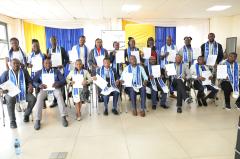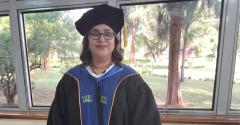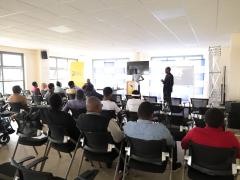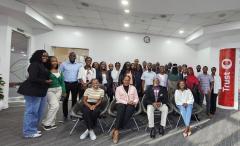SPEAKING REMARKS BY EVANS ATAMBO, STATE DEPARTMENT OF UNIVERSITY EDUCATION AND RESEARCH DURING USIU-AFRICAS 44TH COMMENCEMENT CEREMONY HELD ON SATURDAY, SEPTEMBER 24, 2022
Board of Trustees, the Chancellor, Dr. Manu Chandaria, University Council, Interim Vice Chancellor, Prof. Freida Brown, the Vice-Chancellor Prof. Margee Ensign, University Senate, Management Board, Faculty, Staff, Students, and Alumni present.
Parents and Guardians, the Graduating Class of 2022, Distinguished Ladies and Gentlemen.
Good Morning
I would like to begin by welcoming you to USIU-Africa’s 44th commencement ceremony and it is indeed a great honor and privilege to be speaking at this great and much anticipated ceremony.
This graduation ceremony comes at a special time as the University celebrates its 53 year anniversary; a journey that begun in the United States of America to this institution we see here today. The university boasts of an illustrious history of high quality, broad-based education that ensures each student acquires an international education in a multi-cultural environment with global exposure that distinguishes them in the marketplace. It is also a special moment in history as the University welcomes Professor Margee Ensign as the new Vice Chancellor, and I take this opportunity to also welcome her to USIU-Africa and to Kenya.
Ladies and Gentlemen
We all witnessed as the world was upended by the Coronavirus pandemic but what we did not anticipate is the sheer will of human beings to pivot and turn this challenge into an opportunity. Various sectors of the economy learned how to adjust and I would like to share with you a few key learnings which will likely characterize the future of education, more specifically, Higher Education.
According to a report published by KPMG in 2020 titled ‘the Future of Higher Education in a Disruptive World’, the Golden Age for Universities has passed and disruption is underway. The report proposes four components which will determine institutional success.
The first component is strategy. It is important to start thinking of what the future looks like for universities and how they will execute their core mandate. This will look differently for different universities. We have started to see Universities offer online degrees, students are increasingly yearning for shorter degree programs, and there is an increase for on-demand learning. These are just examples of how strategy will determine how Universities will operate in the future.
The second component is technology. The report indicates that technology will form a large part of how teaching and learning will be delivered in the future. Universities need to make investments in technology which will enable them continue to serve their clients and achieve their goals even when faced by major disruptions.
The third component is capabilities which is a mix of insight-driven strategies and actions coupled with an aligned and empowered workforce, and innovative products and services. The report clearly asserts that: “The quality of personalized student learning will be key to institutional success.”
And the final component is operating model. Many universities have had to go back to the drawing board and ask themselves the critical questions as to why they exist. Universities will have to work very hard to attract and retain students and this is the time to realign.
And now, to the Class of 2022
The workplace has undergone major transformations in the last two and a half years. Most people had to upskill, reskill and retrain in order to adapt to the changing times. Apart from the foundational skills you have acquired throughout your educational journey, research shows that there are soft skills you require in order to prepare for the future of work. A study conducted by Mastercard Foundation in 2020 highlights these other skills as:
- Digital skills – It is the knowledge of and capability to engage with digital technologies for social, political and economic purposes.
- 21st century skills – These include an understanding of innovative processes, critical thinking, problem solving, creativity, and collaboration that are useful in life and on the job.
- Entrepreneurship skills are described as problem solving, creativity, communication and perseverance associated with financial literacy and business management.
- Work-readiness skills – These include the ability to find and succeed in work including networking and job seeking.
The Global Trends for Youth, 2020, published by the International Labor Organization established that young people are spending more time in education, which is critical in ensuring that the future labor force will be better skilled and able to cope with the transformations in the world of work brought about by new technologies and unprecedented disruptions. It further recommends that technology can be used to improve training and promote youth entrepreneurship and self-employment.
I would like to laud USIU-Africa for its role in preparing these graduates, ready to infuse new ideas into the job market not only to find jobs but to create jobs, and build enterprises.
This is a truly defining moment for each and every one of you. You have worked hard to get to where you are today, it did not matter the challenges you faced, you just had to get it done and get to the finish line. You did and you did it well.
Congratulations to each and every one in the Class of 2022.
Thank You.






